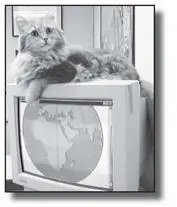He wasn’t the only one. We had three or four people a week coming into the library to show Dewey off. “We’re here to see the famous cat,” an older man said, approaching the desk.
“He’s sleeping in the back. I’ll go get him.”
“Thanks,” he said, motioning to a younger woman with a little blond girl hiding behind her leg. “I wanted my granddaughter Lydia to meet him. She’s in town from Kentucky.”
When Lydia saw Dewey, she smiled and looked up at her grandfather as if for permission. “Go ahead, sweetie. Dewey won’t bite.” The girl tentatively stretched out her hand to Dewey; two minutes later she was stretched out on the floor, petting him.
“See?” her grandfather said to the little girl’s mother. “I told you it was worth the trip.” I suppose he could have meant Dewey or the library, but I suspect he was referring to something more.
Later, while the mother was petting Dewey with her daughter, the grandfather came up to me and said, “Thanks so much for adopting Dewey.” It seemed he wanted to say more, but I think we both understood he had already said enough. Thirty minutes later, as they were leaving, I heard the young woman tell the older man, “You were right, Dad. That was great. I wish we had come by sooner.”
“Don’t worry, Mommy,” the little girl said. “We’ll see him next year, too.”
Pride. Confidence. Assurance that this cat, this library, this experience, maybe even this town, really was special. Dewey wasn’t any more beautiful or friendly after the Country article; in fact, fame never changed him. All Dewey ever wanted was a warm place to nap, a fresh can of food, and love and attention from every person who ever stepped foot in the Spencer Public Library. But at the same time, Dewey had changed, because now people looked at him differently.
The proof? Before the Country article, nobody took the blame for shoving poor Dewey into our book return. Everybody knew the story, but nobody confessed. After Dewey hit the media, eleven different people came up to me confidentially and swore on their mother’s grave (or their mother’s eye, if Mom was alive) that they had shoved Dewey down that hole. They weren’t taking blame; they were taking credit. “I always knew it would turn out well,” they said.
Eleven people! Can you believe it? That must have been one wild, cat-saving alley party.
THE DAILY ROUTINE
As developed by Dewey Readmore Books soon after his regrettable romp outside the Spencer Public Library, and followed for the rest of his life.
7:30 a.m. Mom Arrives.Demand food, but don’t be too hasty. Watch everything she does. Follow at her heels. Make her feel special.
8:00 a.m. Staff Arrives.Spend an hour checking in with everyone. Find out who is having a tough morning and give them the honor of petting me for as long as they want. Or until . . .
8:58 a.m. Prep Time.Take up position by the front door, ready for first patron of the day. Also has the added benefit of alerting distracted staff to current time. I hate it when they open late.
9:00–10:30 a.m. Doors Open.Greet patrons. Follow the nice ones, ignore the mean ones, but give everyone a chance to brighten their day by paying attention to me. Petting me is a gift to you for visiting the library.
10:30 a.m. Find Lap for Nap.Laps are for naps, not playing. Playing in laps is for kittens.
11:30–11:45 a.m. Lounge.Middle of adult nonfiction, head up, paws crossed in front. The humans call this the Buddha pose. I call it the Lion. Hakuna Matata. No, I don’t know what it means, but the kids keep talking about it.
11:45 a.m.–12:15 p.m. Sprawl.When it gets too tiring to hold my head up, assume the sprawl: full out on back, paws sticking out in four directions. Petting is assured. But don’t fall asleep. Fall asleep, and you’re vulnerable to a belly wrestle attack. I hate the belly wrestle attack.
12:15–12:30 p.m. Lunch in the Staff Room.Anybody got yogurt? No? Then never mind.
12:30–1:00 p.m. Cart Ride!When the afternoon clerks shelve books, jump on the cart and hitch a ride around the library. Oh, man, it’s relaxing to go completely limp and let my legs hang down between the bars of the metal rack.
1:00–3:55 p.m. Afternoon Free Time.See how the day is going. Mix in a trip up to the lights with more lap time. Greet the afternoon crowd. Spend ten minutes with Mom. Fur licking is encouraged, not mandatory. And don’t forget to find a nice box to nap in. As if it’s possible to forget that!
3:55 p.m. Dinner.They keep thinking dinnertime is four o’clock. If I sit here long enough, they’ll eventually learn.
4:55 p.m. Mom Leaves.Jump around so she’ll remember you want to play. A running jump off a bookshelf, complete with somersault, works every time.
5:30 p.m. Play. Mom calls it Boodha track.I call it the ball thingy because there’s nothing better than batting that ball around that track. Except for my red yarn. I absolutely love my red yarn. Does anyone want to dangle it for me?
8:55 p.m. Last Shift Leaves.Repeat 4:55 routine, but don’t expect the same results unless Joy’s working the night shift. Joy always finds time to wad up paper and toss it across the library. Sprint after the paper as fast as possible, but once you get there, always ignore it.
9:00 p.m.–7:30 a.m. My Time!None of your business, nosy.
Chapter 17
Dewey in the Modern World

I’m not naive. I know not everyone in Spencer embraced Dewey. For instance, that woman still wrote regular letters threatening to bring her cow downtown if the city didn’t stop the injustice, the horror, of a cat living in a public building. She was the most vocal, but she certainly wasn’t the only person who didn’t understand the Dewey phenomenon.
“What’s so special about that cat?” they would say over a cup of coffee at Sister’s Café. “He never leaves the library. He sleeps a lot. He doesn’t do anything.”
By which they meant Dewey didn’t create jobs. Dewey was appearing regularly in magazines, newspapers, and on the radio around the country, but he wasn’t improving our municipal parks. He wasn’t paving roads. He wasn’t out recruiting new businesses. The worst of the farm crisis had passed; spirits were rising; it was time for Spencer to spread its wings and attract new employers to our plucky Midwest town fairly far off the beaten track.
The Spencer economic development commission scored its first big triumph in 1992 when Montfort, a large meatpacking company headquartered in Colorado, decided to lease the slaughterhouse on the north end of town. In 1952, when local businessmen developed the property, the plant was the pride of Spencer. It was locally owned, locally run, and employed local workers at top wages. In 1974, the salary was fifteen dollars an hour, the best-paying job in town. Trucks lined up for a mile waiting to be unloaded. The company began packaging several products under a Spencer Foods label. That label was a source of pride, especially when you’d drive to Sioux Falls or down to Des Moines and see the Spencer name in the big new grocery stores.
In 1968, sales started dropping. Processing conglomerates had moved into nearby towns with more efficient plants and cheaper labor. The owners tried to rebrand the products and retool the plant, but nothing worked. In 1978, the Spencer Packing Company was sold to a national competitor. When the workers wouldn’t take nonunion wages of five-fifty an hour, the company closed the plant and moved the work to Skylar, Nebraska. Land O’Lakes moved in next, but when the recession hit in the mid-1980s, they closed up and left, too. They didn’t have ties to the community, and there was no economic reason to stay.
Читать дальше













